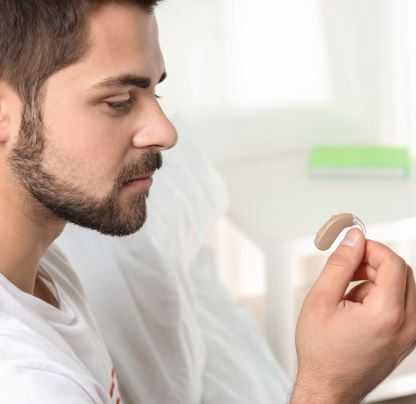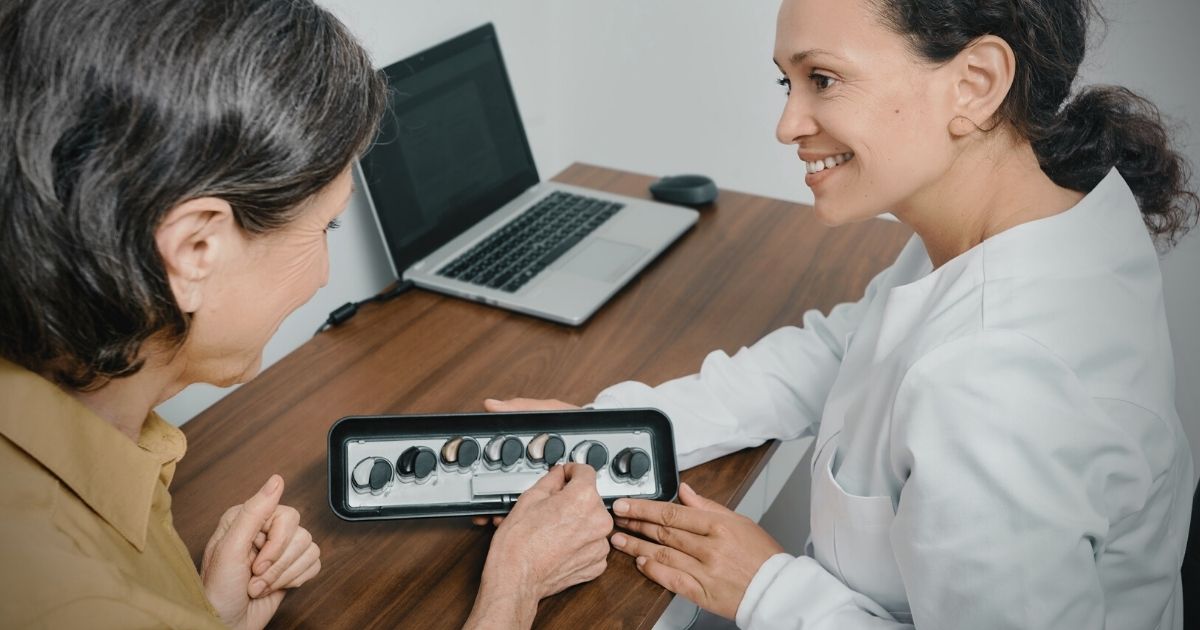By Stephen O. Frazier
I almost let the call go to voice mail. I was busy proof reading a piece that needed to be in the hands of an editor by the end of the day. I thought I recognized the number, though, so I took the call. I was wrong – I didn’t know the caller but when he told me why he was calling I couldn’t not continue the conversation.
The caller was looking for help for his eighty year old father who had just gotten his first pair of hearing aids. The son told me his father’s hearing aids were “tiny things,” and that he had difficulty putting them in and taking out. He was having trouble adapting to them and frustrated at his increasing inability to hear, to participate in his favorite activities.
His growing isolation resulting from his inability to talk to friends and family on the phone bore down on the whole family – recalling Dr. Mark Ross’s dictum that if one person in a family has a hearing problem, the whole family has a hearing problem.
In light of the dexterity problems I was told the father had, I suspected he had gotten over-the-counter (OTC) hearing aids as those “tiny things” seemed to me to be exactly the wrong thing to fit him with. A behind-the-ear, receiver in the canal, rechargeable pair with telecoils seemed a better option. Further, I learned he knew nothing about other devices that could be of enormous help to him like a Bluetooth® transmitter or hearing loop for the TV, or a text telephone. He was not aware of the local hearing device retail shop or of the local Hearing Loss Association of America chapter where he could socialize with and learn from his contemporaries. He was living on limited income and could use some of the free equipment available to him from the state’s equipment distribution program at the Commission for Deaf and Hard of Hearing, but he knew nothing of this state agency.
He, and his family, could obviously benefit from some counseling and possibly a handout on coping strategies and the do’s and don’ts of communication for people with hearing loss. Alas and alack, while reviewing all of these things, I learned that pop’s hearing aids were not purchased over the counter, they were dispensed by a hearing care professional…
Getting Hearing Aids vs. Getting Hearing Care

OTC hearing aids are less expensive specifically because they don’t include in-person counseling and assistance of a licensed professional
Having been trained by the Hearing Loss Association of America as a Hearing Loss Support Specialist, I have spent the last twenty years counseling hard of hearing people at HLAA chapter meetings, in presentations on “Living With Hearing Loss” and other topics, and even in private one-on-one sessions. When doing so I tell people about all of the things I reviewed with the caller seeking help for his father. I tell them the things my very first hearing care provider told me in 1985 when I bought my first pair of hearing aids. At presentations and some other meetings, like the one that hearing care professional gave me, I hand out a tri-fold brochure on assistive devices that can supplement the benefits of hearing aids. Another handout is the do’s and don’ts for communication involving someone with hearing loss.
I thought about this man again while reading a magazine article focused on the provision of hearing care and discussing how audiologists and hearing instrument specialists can differentiate their business model from that of the plethora of OTC hearing aid retailers now springing up like weeds after a summer rainstorm here in the desert southwest. The old saying, “You don’t know what you don’t know,” came to mind. The father of the man I talked to was a prime example.
He was sold a pair of hearing aids but was he given “hearing care”? Was he told about telecoils and the many places they can be used in Albuquerque? No, even though state regulations mandate that the provider do so. Was he counseled in the devices that could supplement his hearing aids like alerting devices or apps for his phone? Not a word. Of the services of the Commission for the Deaf and Hard of Hearing including a free Captel captioned phone? Doesn’t ring a bell. Of HLAA? What’s that?
To me, hearing care should include all of that information, that’s what you’re paying for when you buy a pair of hearing aids for $3,000 that can pretty much be duplicated with a $1,200 OTC pair.
Such counseling would help build a sense of respect and gratitude in the client toward the person who helped to dramatically improve his or her quality of life. It could result in repeat business and referrals for years. Studies have shown that demonstrating how a looped TV could not just end the battle of the remote in a home, it could win a customer for life.
If you’re paying a “blue shirt” at Best Buy or the person at the prescription counter at Walgreens for a pair of over-the-counter hearing aids, you’re getting exactly what you paid for. If you’re paying a trained and licensed professional for hearing aids, it seems to me that you should also be getting hearing care that includes a lot more counseling and information than what appears in the user manual for the hearing aids you’re paying for.
About the Author
Stephen O. Frazier is a freelance writer and long time advocate for people with hearing loss. He served a decade as the New Mexico Chapter Coordinator for the Hearing Loss Association of America and on the HLAA Get in the Hearing Loop committee while also serving in a variety of positions in the local HLAA chapter. He has presented workshops at the national conventions of the nation’s three top hearing loss support organizations and in person or via zoom to groups stretching from California to New York. His work has been published in most of the major hard copy and online hearing loss related periodicals and he publishes a quarterly newsletter entitled “In the Loop”. Sign up for it at https://www.sofnabq.com/Contact.html or it and his writings are posted at www.sofnabq.com . Steve can be emailed at [email protected].







Bravo, Stephen.
Stephen, I have written a book about these very issues. Would you be willing to read the manuscript? It’s about 120 pages (typed, double-spaced) long.
In case you don’t remember me, Warren Brown and I have been trying to get loops installed in public places (particularly the airport) in Northeast Ohio. We also published an article together in Hearing Life about loops in the Geauga County Libraries in Ohio.
All best,
Dorothy
Dorothy – I would be delighted to read your book. I’m also curious about what airport you’re encouraging to install loops. I can will send you some info that might be helpful in the airport project. The Albuquerque airport is in talks right now with one of their major airlines re the idea and an advocate is pushing the administration of the Lincoln, NE airport to do likewise. Thanks to both you and Warren for your efforts on behalf of the HoH.
Steve
Hi Steve,
This article is excellent. It mirrors a conversation I had just this morning with a provider whom I have great respect for. So much of the success achieved by persons who need hearing aids, especially their first pair, is based on the counseling and understanding of feelings provided by the person dispensing the hearing instruments. This provider has that down. Anyone can plop a pair of hearing aids in someone’s ears and send them on their way. Some who are fitted that way will be OK, but most will be frustrated and disappointed.
I just published a book called “Can She HEAR This Cat’s Meow?”. * The subtitle is: Living with Grandma’s Hearing Loss from a Kid’s Perspective. I really should have changed that subtitle to ‘Living with a Family Member’s Hearing Loss’, as the story relates well to the Mark Ross comment about “If someone in a family has a hearing problem everyone in the family has a hearing problem. ” My granddaughter and I co-authored this book based on her figuring me out as a child, and me figuring out how to advocate and help myself. The story shares the value of technology, peer support, self advocacy, etc.
Back at today’s experience. I was surprised when my very experienced provider said she doesn’t always activate, explain, or demonstrate the value of telecoils unless they say they go to places where hearing loops are installed. Yikes! If one doesn’t know what a telecoils is or does, or what a loop does, they simply say “I don’t go to places where I can’t hear”, etc. etc. You know the rest. Needless to say, it was a teaching moment. 🙂
‘Cat’s Meow’ is available on Amazon or directly from me. So good to have books out there that offer some of the peer support and council that people desperately need when hearing loss becomes a part of their lives. Decades ago when I was diagnosed with progressive sensorineural hearing loss there were zero books on this topic, and no organizations like HLAA to provide information, support and advocacy. Cheers to the people who are giving of themselves to do it now! Thank you
Julie Olson, Hearing Loss Support Specialist
(Appleton Wisconsin) [email protected]